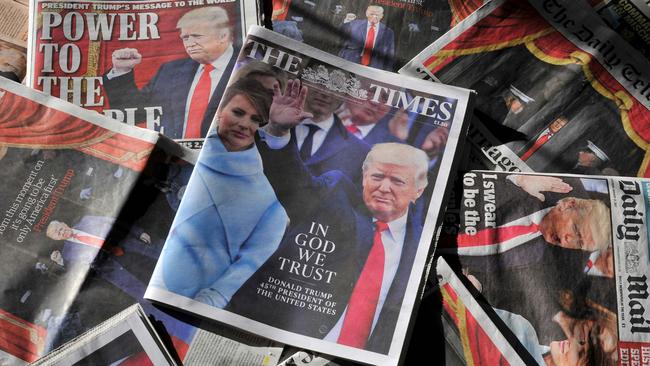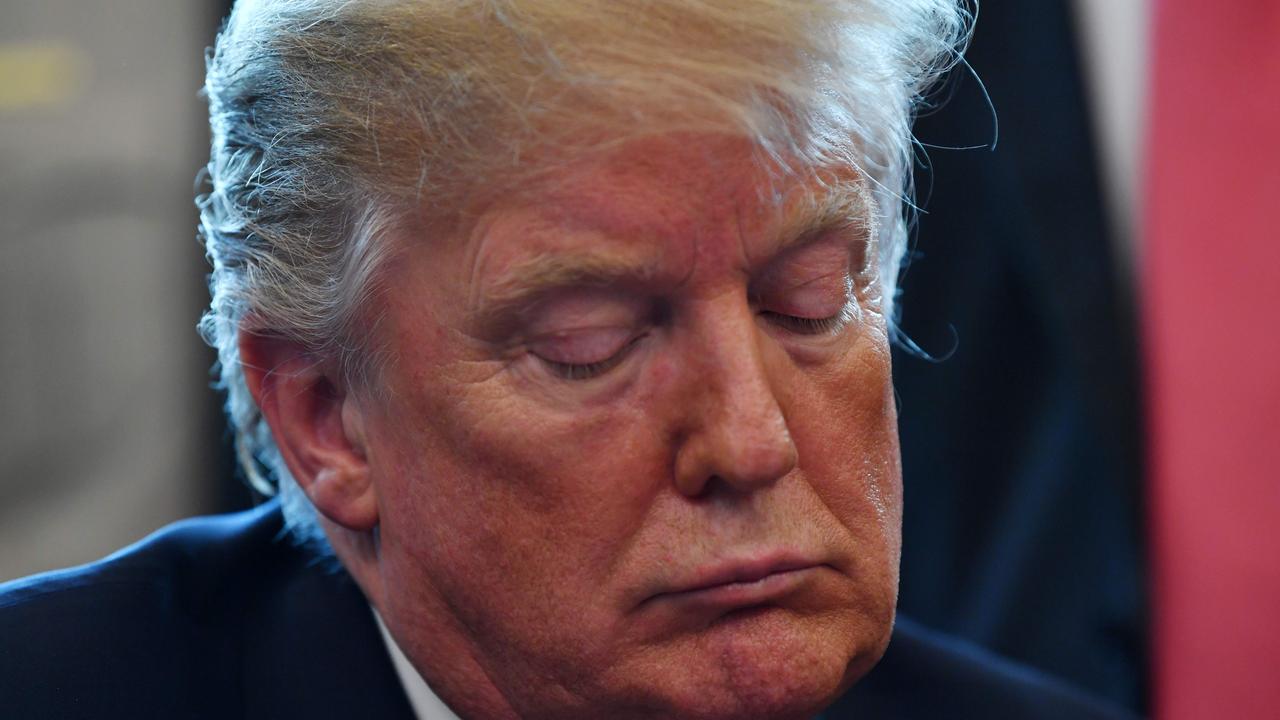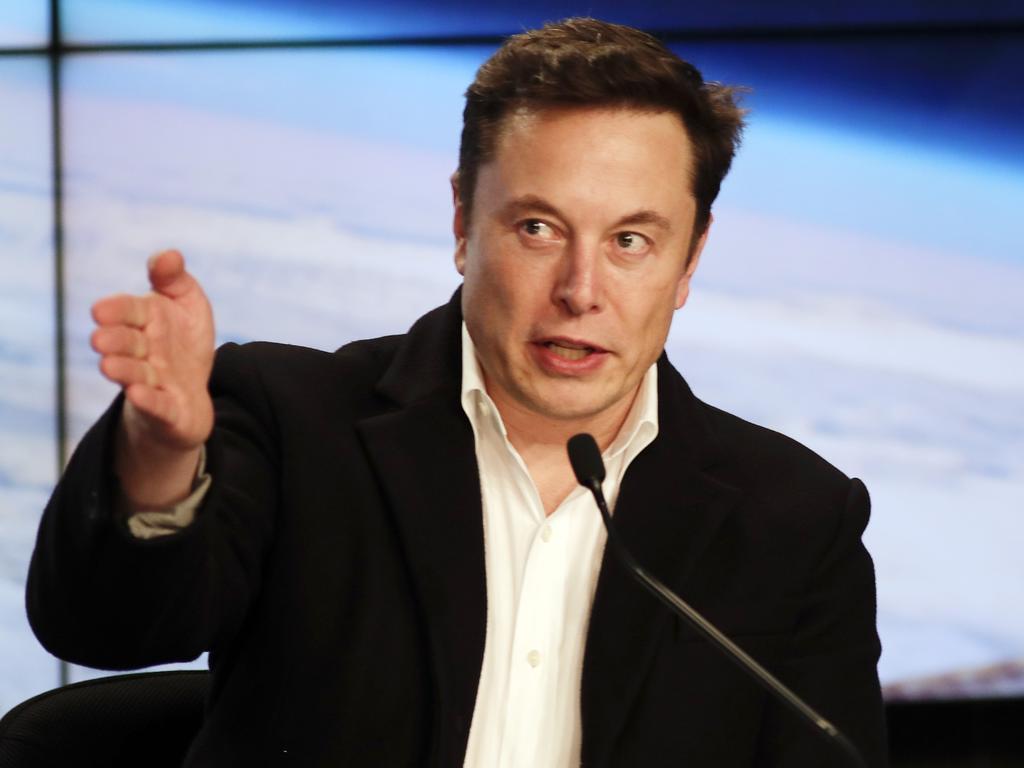Donald Trump: Nations show goodwill, uncertainty
Global leaders responded to the Trump inauguration with wishes for good or better relations with the US, while protests rolled on.

Global leaders have responded to the inauguration of President Donald Trump with wishes for good, and in some cases improved, relations with the US — amid concerns amplified by his inaugural pledge that, “from this day forward, it’s going to be only America first”.
Europe’s leading anti-immigrant and anti-establishment politicians cited him as an inspiration.
Thousands of people marched through central London on Saturday as part of a global day of protests against new US President Donald Trump and his derogatory remarks about women.
Mr Trump had indicated before the inauguration that he would rewrite many long-established US policy positions, and a common thread in official reactions from around the world was a hope for healthy ties.
Japanese Prime Minister Shinzo Abe said he looked forward to working with the new president. Mr Trump criticised Japan on the campaign trail, but a meeting with Mr Abe after the election appeared to calm things down.
Amid security concerns in the Asia-Pacific region, Mr Abe said, “I would like to further strengthen the unwavering tie between Japan and the United States based on the relationship of trust between us the two leaders.”
In Germany, a spokesman for Angela Merkel said the chancellor would study the inaugural speech — and that close co-operation with Mr Trump and his team would begin in the coming days.
Yet Vice-Chancellor Sigmar Gabriel tweeted words of warning: “Dear USA, stay the land of the free and the home of the brave.”
Some German politicians reacted to Mr Trump’s address with concern. “Closing borders, America first, and the blood of a patriot. I am very cold,” Katrin Göring-Eckardt, co-head in the German parliament of the left-of-centre Greens, wrote on Twitter.
Pope Francis sent Mr. Trump a message from the Vatican: “I pray that your decisions will be guided by the rich spiritual and ethical values that have shaped the history of the American people and your nation’s commitment to the advancement of human dignity and freedom worldwide.”
The two sparred in February 2016 after the pope criticised Mr Trump’s proposal to build a wall along the Mexican border to keep out illegal immigrants. Mr Trump called the pope “disgraceful”.
There also were notes of caution from Asia. In an opinion piece on Saturday in the Hong Kong-based South China Morning Post, an influential English-language newspaper owned by Alibaba founder Jack Ma, columnist Andrew Sheng suggested that Asians would need to be more self-sufficient under a potentially unpredictable US President willing to shake up the status quo, even with America’s staunchest allies in the region.
“As America moves to a new … junction, the choice is not between left or right, but between a great America or a small-minded America. Time for Asians to think and act for themselves,” Sheng wrote.
South Korea’s centre-right newspaper Joongang Ilbo, one of the country’s biggest-circulation dailies, said in an editorial on Saturday that “our relations with the US will face a challenge as Trump will most likely call for us to assume a bigger share in the cost of US forces here and a renegotiation of the Korea-US Free Trade Agreement”. But the editorial also praised Mr Trump for taking a hard-line on North Korea’s nuclear-development program.
The Hangook Ilbo, another Seoul daily, was blunt: “Now, everything becomes uncertain,” the headline read, with a close-up photo of Mr Trump blanketing most of the front page.
Europe’s leading anti-immigrant and anti-establishment politicians rallied in the Rhineland on Saturday to launch an election year they hope will topple the European Union, displaying a new level of ambition and organisation and casting Mr Trump as their inspiration.
It was the first time that Marine Le Pen, the French nationalist leader vying for the presidency, campaigned alongside Frauke Petry, the most prominent of Germany’s anti-immigrant politicians. Leaders from Austria, the Netherlands and Italy joined them in ridiculing Ms Merkel and congratulating Mr. Trump — echoing or even directly quoting from his inaugural address.
“My friends, this year will be the year of the people — the year in which the voice of the people is finally heard,” said Geert Wilders, who is seeking to become the prime minister of the Netherlands in March elections, despite having been found guilty by a Dutch court in December of inciting discrimination.
Polls show that all of the politicians face long odds in this years’ elections, but after the UK’s Brexit vote and Mr Trump’s win, they are hoping to ride a global wave of antiestablishment sentiment.
While the parties gathered in Koblenz have divergent economic agendas, they all deploy anti-immigration and anti-Islamic rhetoric, slam Ms Merkel’s acceptance of refugees, and want to weaken or destroy the EU.
Mr. Trump has signalled support for anti-EU parties, praising Britain’s decision to exit from the bloc and predicting other countries would follow suit.
Officials in countries that have had frosty ties with the US signalled hope that they could work with the new administration.
Russia’s embassy in Washington tweeted: “It is possible to solve many problems if Russia, US focus on a pragmatic search for shared interests” and attached a photo of an invitation to the inauguration festivities.
In Moscow, more than 100 Russians from the nationalist-leaning sectors of society gathered in a Soviet-era telegraph office, where they drank champagne and toasted the new US president.
Members of the pro-Kremlin art collective “White Star” attended the event. “We didn’t hack the election!” said member Mikhail Kovalyov, wearing a Trump and Pence baseball cap.
In London the largely female protest crowd, which also had many men and children, marched from the US embassy to Trafalgar Square, chanting “dump Trump” and waving banners demanding equal rights.
“Trump Special Relationship: Just Say No” and “Our Rights Are Not For Grabs — Neither Are We” were among the banners held aloft, along with “We shall overcomb” and “Make bigotry wrong again”.
Hannah Bryant, a 34-year-old museum worker, brought her four-year-old daughter — both of them wearing bright pink “pussy hats” worn by US demonstrators.
In Bolivia, President Evo Morales, a critic of the US who expelled the American ambassador nearly a decade ago, said on Twitter that he hoped to improve ties with Mr Trump’s administration by exchanging ambassadors.
He said he hoped Mr Trump reduces foreign interventions and the expansion of military bases “to guarantee peace with social justice”.
Egypt’s President Abdel Fattah Al Sisi said he expected “a new momentum in the trajectory of Egyptian-American relations” under Mr Trump’s administration.
In Mexico, which has had strong relations with the US, officials and business owners are watching the start of the presidency with concern and caution. Since Mr Trump’s victory, the Mexican peso has plunged to historic lows against the dollar, while new investment has dried up — victims of Mr Trump’s pledge to renegotiate or rescind the North American Free Trade Agreement.
“For the whole world a period of turbulence is beginning, without direction, in which there appears nothing good will happen, at least not in the short and medium term,” wrote former Foreign Minister Jorge Castañeda.
Hillary Clinton outperformed Mr. Trump in global popularity polls during the 2016 campaign, and anti-Trump protests sprung up in several foreign cities, including Sydney, Melbourne, Brussels and Berlin.
In Manila, protesters gathered near the US embassy to warn their country’s leader not to get too close to Mr Trump.
Holding placards and chanting “Dump Trump”, they said they wanted to send a message that Mr Trump’s presidency could endanger the status of Filipino immigrants living in the US They also protested against US access to Philippine military bases and complained that Mr Trump’s election set back the cause of women’s rights.
The Wall Street Journal






To join the conversation, please log in. Don't have an account? Register
Join the conversation, you are commenting as Logout